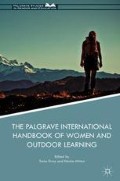Abstract
This chapter explores how relational work in communities of practice (CoP) can enhance learning and teaching in outdoor education. It challenges a view that interpersonal skills supporting collaborative endeavour are women’s work. I draw on the notions of relational agency, relational expertize, and communities of practice to expand understanding of affective and collaborative pedagogy in outdoor education. These lenses are used to revisit a study investigating sense of competence conducted at a university in Australia. I suggest that outdoor educators can generate more productive engagement and expand their repertoires of practice by valuing differing participant values or standpoints in education and community contexts. I contend that outdoor educators and outdoor education practice can benefit from re-envisaging relational work as everybody’s concern, not just women’s work.
Access this chapter
Tax calculation will be finalised at checkout
Purchases are for personal use only
References
Allin, L. (2000). Women into outdoor education: Negotiating a male-gendered space—Issues of physicality. In B. Humberstone (Ed.), Her outdoors, challenge and adventure in gendered open spaces. Brighton, UK: Leisure Studies Association.
Bell, M. (1997). Gendered experience: Social theory ad experiential practice. The Journal of Experimental Education, 20(3), 143–157.
Carter, M. (2000). Developing confidence in women working in the outdoors: An exploration of the confidence and competence in women employed in adventure recreation. In B. Humberstone (Ed.), Her outdoors, challenge and adventure in gendered open space. Brighton, UK: Leisure Studies Association.
Edwards, A. (2005). Relational agency: Learning to be a resourceful practitioner. International Journal of Educational Research, 43(3), 168–182. https://doi.org/10.1016/j.ijer.2006.06.010
Edwards, A. (2007). Working collaboratively to build resilience: A CHAT approach. Social Policy and Society, 6(2), 255–264. https://doi.org/10.1017/S1474746406003514
Edwards, A. (2011). Building common knowledge at the boundaries between professional practices: Relational agency and relational expertise in systems of distributed expertise. International Journal of Educational Research, 50(1), 33–39. https://doi.org/10.1016/j.ijer.2011.04.007
Edwards, A. (2012). The role of common knowledge in achieving collaboration across practices. Learning, Culture and Social Interaction, 1(1), 22–32. https://doi.org/10.1016/j.lcsi.2012.03.003
Edwards, A., & D’arcy, C. (2004). Relational agency and disposition in sociocultural accounts of learning to teach. Educational Review, 56(2), 147–155. https://doi.org/10.1080/0031910410001693236
Edwards, A., & Kinti, I. (2010). Working relationally at organisational boundaries: Negotiating expertise and identity. In H. Daniels, A. Edwards, Y. Engeström, T. Gallagher, & S. R. Ludvigsen (Eds.), Activity theory in practice: Promoting learning across boundaries and agencies (pp. 126–139). London, UK and New York, NY: Routledge.
Edwards, A., & Mackenzie, L. (2007). Identity shifts and learning trajectories. In B. van Oers, W. Wardekker, E. Elbers, & R. van der Veer (Eds.), The transformation of learning: Advances in cultural-historical activity theory (pp. 163–181). Cambridge, UK: Cambridge University Press.
Green, M. (1994). A study of some of the influences affecting the learning of tertiary women involved in outdoor education. Unpublished master’s thesis, Deakin University, Geelong, Victoria, Australia.
Gurholt, K. P. (2014). Joy of nature, friluftsliv education and self: Combining narrative and cultural-ecological approaches to environmental sustainability. Journal of Adventure Education and Outdoor Learning, 14(3), 233–246. https://doi.org/10.1080/14729679.2014.948802
Lave, J., & Wenger, E. (1991). Situated learning: Legitimate peripheral participation. Cambridge, UK: Cambridge University Press.
Loeffler, T. A. (1997). Assisting women in developing a sense of competence in outdoor programs. The Journal of Experiential Education, 20(3), 119–123.
Lugg, A. (2003). Women’s experience of outdoor education: Still trying to be ‘one of the boys’? In B. Humberstone, H. Brown, & K. Richards (Eds.), Whose journeys? The outdoors and adventure as social and cultural phenomena (pp. 33–48). Selected papers from the International Conference Buckinghamshire Chilterns University College, England, April 2002.
Mitten, D., Lotz, E., Warren, K., & D’Amore, C. (2012). The hidden curriculum in adventure education: A Delphi study. In A. Ewert & S. Taniguchi (Co-Chairs), Symposium on experiential education research (pp. 37–40). Symposium conducted at the meeting of Association for Experiential Education International Conference, November, Madison, WI.
Munge, B. (2009). From the outside looking in: A study of Australian employers’ perceptions of graduates from outdoor education degree programs. Australian Journal of Outdoor Education, 13(1), 30–38.
Payne, P. (2005). ‘Critical’ experience in outdoor education. In T. J. Dickson, T. Gray, & B. Hallyar (Eds.), Outdoor and experiential learning: Views from the top (pp. 184–200). Dunedin, NZ: Otago University.
Preston, L. (2012). An outdoor and environmental education community of practice: Self stylisation or normalisation? Australian Journal of Outdoor Education, 16(1), 28–38.
Wagner, J. (1993). Ignorance in educational research or, how can you not know that? Educational Researcher, 22(5), 15–23. https://doi.org/10.3102/0013189X022005015
Wenger, E. (1998). Communities of practice: Learning, meaning and identity. Cambridge, UK: Cambridge University Press.
Author information
Authors and Affiliations
Editor information
Editors and Affiliations
Rights and permissions
Copyright information
© 2018 The Author(s)
About this chapter
Cite this chapter
Lugg, A. (2018). Becoming Relational in Outdoor Education: Not Just Women’s Work. In: Gray, T., Mitten, D. (eds) The Palgrave International Handbook of Women and Outdoor Learning. Palgrave Studies in Gender and Education. Palgrave Macmillan, Cham. https://doi.org/10.1007/978-3-319-53550-0_20
Download citation
DOI: https://doi.org/10.1007/978-3-319-53550-0_20
Published:
Publisher Name: Palgrave Macmillan, Cham
Print ISBN: 978-3-319-53549-4
Online ISBN: 978-3-319-53550-0
eBook Packages: EducationEducation (R0)

